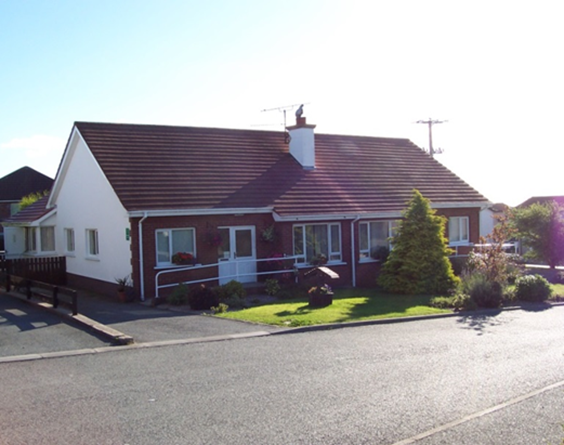The Southern Health and Social Care Trust in partnership with the Northern Ireland Housing Executive/Supporting People Initiative, provide accommodation and a support service in Shanlieve, to individuals with a learning disability living in their own home. The main accommodation is situated 1-3 Randall Heights, Newry Street, Kilkeel. The property is located a short walk or drive to the centre of Kilkeel. The service users in Shanlieve have access to transport through a car which is available to them for appointments, home visits, shopping and social activates. The car is driven by Shanlieve staff and maintained by SHSCT Transport Services. The service users are charged a small mileage fee per month depending on their usage of the car.
Care/Support and housing is offered & tailored to meet the needs of each individual service user. A care/support plan is developed with the service user in partnership with themselves or their representative to identify the areas of care/support required. All care/support plans are reviewed annually at the service user’s review or as required if the service users’ needs were to change. This would be determined through a Multi-Disciplinary Team meeting. At review time the case manager will also look at the income and expenditure of the service user to ensure they have adequate income to maintain their tenancy and lifestyle choices.
Service Users are supported to maintain their tenancy and encouraged to be as independent as possible. Health Professionals and support staff will work with service users to promote, encourage, and help them learn new skills for daily living example cooking, housekeeping, budgeting, road safety, transport and accessing learning opportunities. This enables the service user to work towards more independence and gives them confidence to achieve their own goals and ambitions in life.
We have three service users living in Shanlieve main house. There are three rooms one bedroom has an en-suite and the other two bedrooms have access to two separate bathrooms. The staff offices are located in the main building and consist of 2 rooms which the service users have access to. The premises also has a sitting room, kitchen, dining room and laundry room which are all shared communal areas.
Shanlieve also supports four further service users to live in accommodations close to Shanlieve and they have access to Shanlieve 24hr service for support and care.
Staffing resources are used to ensure a high quality of support is maintained which affords continuity of care and accountability for all work practices. The level of support can range from a few hours a week to 24 hours a day up to seven days per week. Everyone is different and will have their own bespoke care and support requirements.
Please see pictures of service users at events in Shanlieve and within the Newry and Mourne area.
Contacts
-
Description of services/opportunities provided
Range of services provided are;
- Assistance with personal care as per the individual’s assessed need.
- Support to maintain and enhance an individual’s life skills through setting agreed and realistic goals
- Support with domestic tasks and food preparation/cooking
- Assistance with managing money and dealing with correspondence
- Assistance with medication
- Support to maintain tenancy re; completing forms / liaising with DHSS/ Housing executive/ housing landlord and Trust
- Advising individuals about safety and security in the community and their own home
- Support with community integration and accessing local services
- Support with neighbour disputes
- Support to attend appointments
Our key objectives are designed to: –
- Engage in regular community experiences by being supported to use local resources.
- Experience maximum choice and participation in their support arrangements by being involved in developing their support plans.
- Receive individually tailored support programmes to enable individuals to achieve maximum control of all aspects of their lives by assessing and planning their support needs with relevant others.
- Promotion of a person centred approach.
- Regular consultation with tenants on the everyday service.
- Enjoy a greater circle of informal support in their lives. This is achieved with greater participation in the community.
- Maintain and promote individuals’ independence in all areas of their lives, in accordance with their assess needs.
-
Routes to access the service
Following an assessment of need, where alternative accommodation is required the case manager in consultation with the service-user, their carers and the multi-disciplinary team present their case to the Accommodation Panel. The aim is to ensure that the service-user’s needs are prioritised. When an appropriate vacancy within a supported living scheme becomes available and is offered to the service-user the case manager will support in their move to their new home.
-
Referral criteria
The service-users’ needs to have a confirmed learning disability and be an open case to the Community Learning Disability Team, Southern Health & Social Care Trust;
Based on the service-user’s assessment of need, there is evidence of care/support needs, and their needs can be met within a supported living scheme;
Our supported living scheme cater for a wide range of care/support needs so it is important that the appropriate scheme is identified to meet the individual needs of the service-user;
The service-user must be actively involved in the process and be happy with their new accommodation;
The service-user must be eligible for housing benefit of if not agree to pay full-costs;
The service-user/appointee must agree to pay the costs associated with a tenant living in the scheme.
- Leaflets
-
Team members
Manager Dympna Casey
Assistant Manager Pauline Burns
Senior Support Workers Edel Lagan, Claire Maudsley, Kathleen McAleenan, Geraldine O’Connor, Joanna Polland and Corinne Trainor
Support Workers Orla Donnan, Michelle Hanna, Alison Hodson, Louise Smith, Dave Millar, Julie McCartan, Meadhbh McConville, Edith Pue, Bernice Sloan
Admin Ciara Gorman
-
Awards won/nominations
A former staff member based in Shanlieve Mrs Jennifer Stone was nominated for an award at The Northern Ireland Disability and Autism Awards.
Jennifer supported one of our former service users to find and locate his half siblings with the support of a genealogist. This was a great success and the service user was able to meet and develop meaningful relationships with family he didn’t know he had. This was so rewarding for our service use and their family and meant so very much to them
-
Makaton signing/easy read
Through the SHSCT Occupational Therapy Dept. All staff receive signs of the week in Makaton which we can learn and share with our service users. This is great for staff and service users to take the opportunity to learn a new communication skill.
- Service User / Carer / Family Testimonials
-
Advocacy services & contacts
Making a referral
Anyone can make a referral to the service. If you would like to contact and Advocate please telephone 028 9029 7880 and someone will take a message and pass it onto an Advocate. You can also email sineadcampbell@disabilityaction.org














